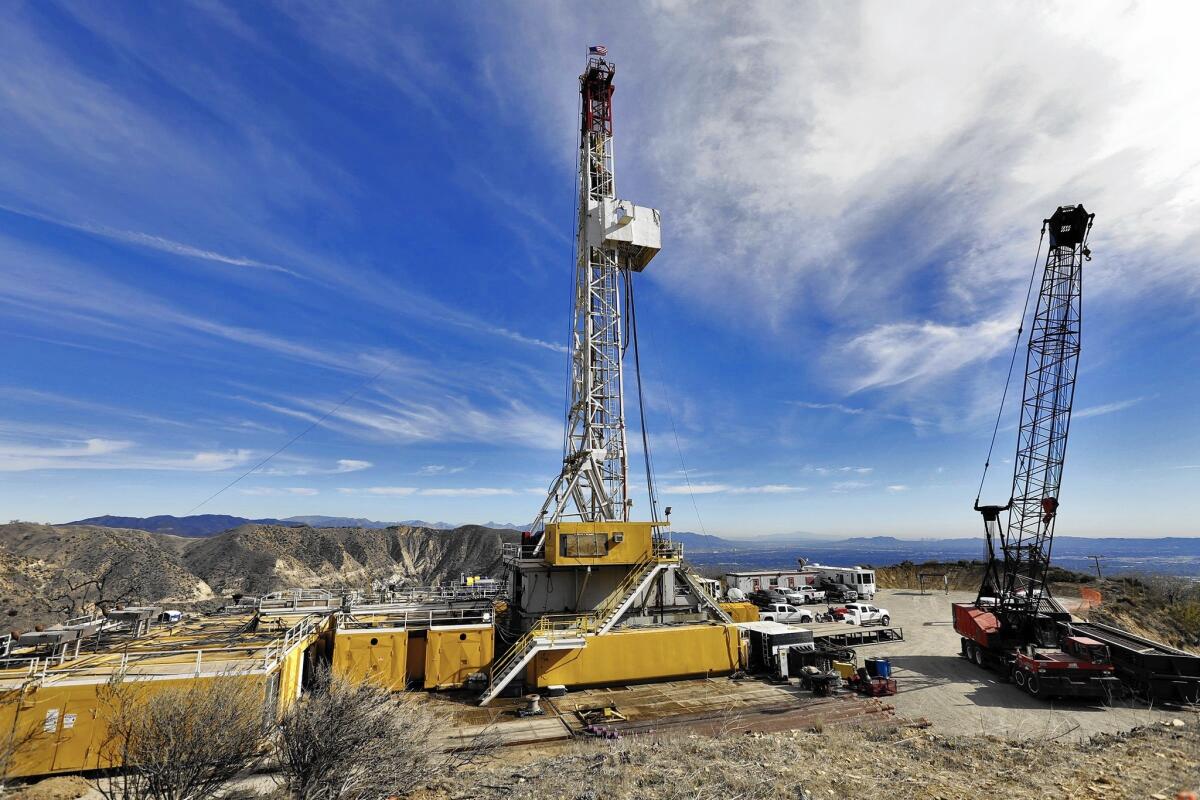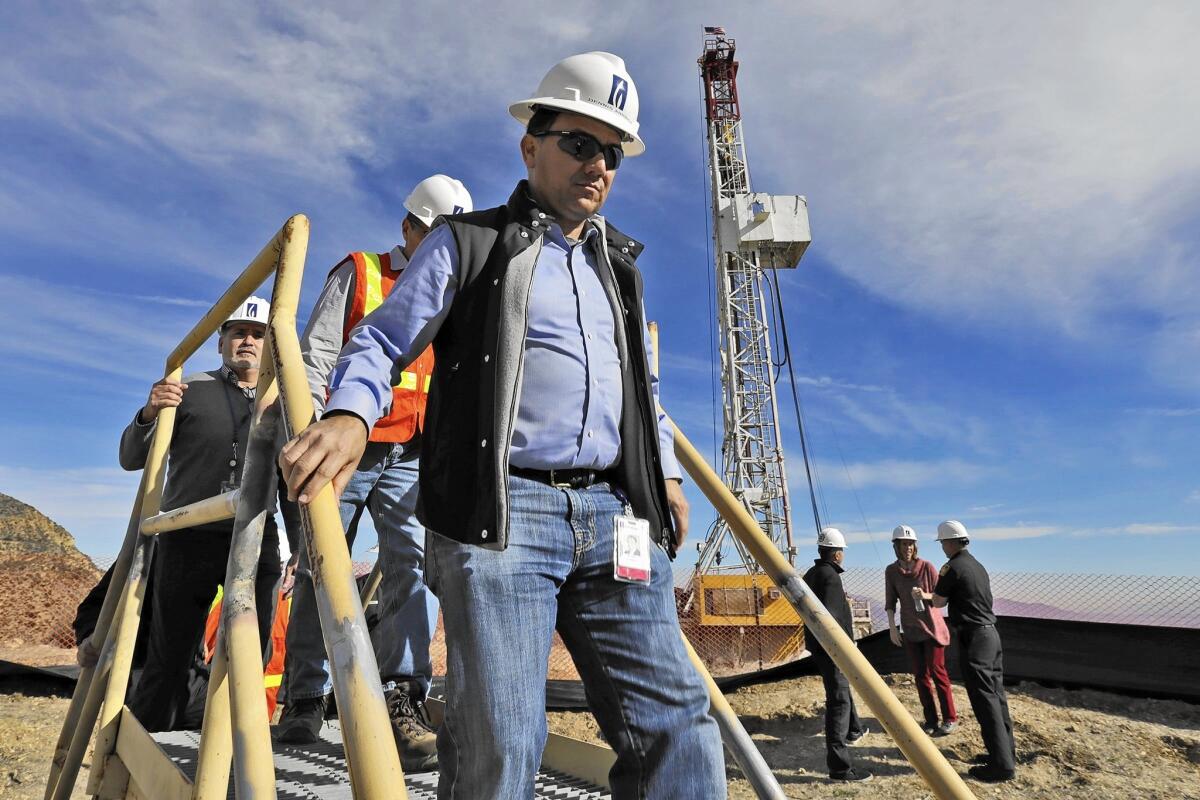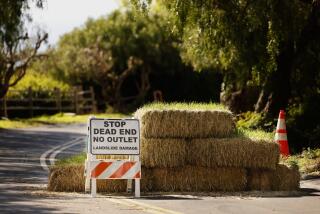Leaking gas well in Porter Ranch area lacked a working safety valve

A relief well being drilled last month to stem the gas leak in Porter Ranch.
A leaking natural gas well that has displaced thousands of residents in Porter Ranch lacked a working safety valve, sparking new questions about how the facility was maintained.
Attorneys for residents suing Southern California Gas Co. said the company failed to replace the safety valve when it was removed in 1979.
See the most-read stories this hour >>
The safety valve may not have prevented the leak, but it would have stopped the continued release of fumes pouring into the community, attorney Brian Panish said in an interview Sunday.
SoCal Gas spokeswoman Melissa Bailey confirmed in an email to The Times that the well did not have “a deep subsurface valve.” She said such a valve was not required by law.
Citing pending litigation, Bailey declined to answer further questions but urged residents of the San Fernando Valley community to wait for the findings of an independent investigation.
“Until the facts are determined and this assessment is completed, it is premature to comment further on the well or the cause of the incident,” Bailey said. “In the interim, SoCal Gas will continue to focus its efforts on stopping the leak as soon as possible.”
The damaged well began leaking Oct. 23. The gas company estimates that crews won’t plug the leak at the Aliso Canyon Underground Storage Facility until at least late February or possibly March.
Join the conversation on Facebook >>
An amended lawsuit filed against SoCal Gas on Dec. 29 cited failure by the company to follow laws protecting the community and the removal of the safety valve, which would have been at the base of the well about 8,500 feet below the surface. The complaint says the decisions “ultimately resulted in a massive leak of natural gas mixed with various other chemicals like benzene (a known carcinogen) and gases including hydrogen sulfide, sulfur dioxide and methane.”
“Had we had [the safety valve], this whole problem would have been prevented,” Panish said. “There would have been a small runoff of some gas and it would have been over. All these people wouldn’t have had to leave and they wouldn’t be sick. It’s critical to the whole case.”
In 1979, SoCal Gas told state regulators that it replaced the safety valve on the well, according to attorneys for the residents. But Rodger Schwecke, a SoCal Gas executive, said in a public meeting last month that the valve was old and leaking and the company decided not to replace it because it was not a “critical well,” attorneys said.
Critical wells are defined as those being 300 feet from homes, according to state law. The leaking well is about a mile from residences.
Complaints about the fumes from the leak in the former oil field, which is used to store gas for distribution to nearly 22 million customers in the Los Angeles Basin, have drawn national attention.
Health officials have said the gas is not harmful, but the chemicals added to help communities detect such leaks can cause short-term ailments.
Thousands of families have applied for temporary alternative housing. Schoolchildren are being temporarily relocated to other campuses. Nearby hotel rooms and short-term rentals cannot keep up with demand. And celebrity activist Erin Brockovich visited Porter Ranch residents last month and has appeared on several TV talk shows to discuss the issue.

Southern California Gas Co. President and CEO Dennis Arriola, left, at the drilling of relief well in Porter Ranch last month.
The leak comes from a damaged well known as SS-25, for Standard Sesnon 25. Engineers speculate that a 7-inch pipe ruptured 500 feet below the surface. The well went into operation on Feb. 25, 1954, and was converted to a gas storage well in 1973. Its pipes are 61 years old.
Previous attempts to the plug the leak have been unsuccessful. SoCal Gas is drilling relief wells to pump fluids in to stop the gas flow, and crews reached 4,800 feet Sunday — more than halfway to 8,500 feet, the required depth to reach the area where the pipe meets the capstone.
As the relief wells are drilled, SoCal Gas has succeeded in cutting the escaping fumes in half by reducing the pressure in the underground reservoir. The company has drawn down levels of gas, using it to supply customers and injecting it into other fields, while not replenishing the supply.
Easing the pressure not only reduces the emissions reaching Porter Ranch but also makes killing the damaged well easier. At its peak on Nov. 28, the well blew nearly 60,000 kilograms of methane an hour into the atmosphere. By Dec. 22, that rate had dropped to 30,300, according to the state’s Air Resources Board.
The goal is to reduce the pressure from 2,700 pounds per square inch to 1,000 to 1,200 pounds before the relief wells reach their target, officials said.
Once the leak is stopped, SoCal Gas, the Department of Conservation and the Public Utilities Commission will look for its cause. Jason Marshall, a department official, said he believes the answers will affect industry practices in the future.
Questions about a lack of a safety valve at the site were first reported by LA Weekly.
The Aliso Canyon site has a history of problems. A blowout and fire occurred at one of the wells Dec. 18, 1968, when an operator attempted to remove two gas-lift valves, according to state records.
The derrick and other equipment were destroyed, but there were no injuries. The area was far less populated at that time.
Times staff writer Thomas Curwen contributed to this report.
ALSO
California’s new laws for 2016: See how you are affected
Carjacking suspect tied to violent crimes and Long Beach standoff has died, police say
California will see a lot more disease-carrying mosquitoes this year, experts say
More to Read
Sign up for Essential California
The most important California stories and recommendations in your inbox every morning.
You may occasionally receive promotional content from the Los Angeles Times.












